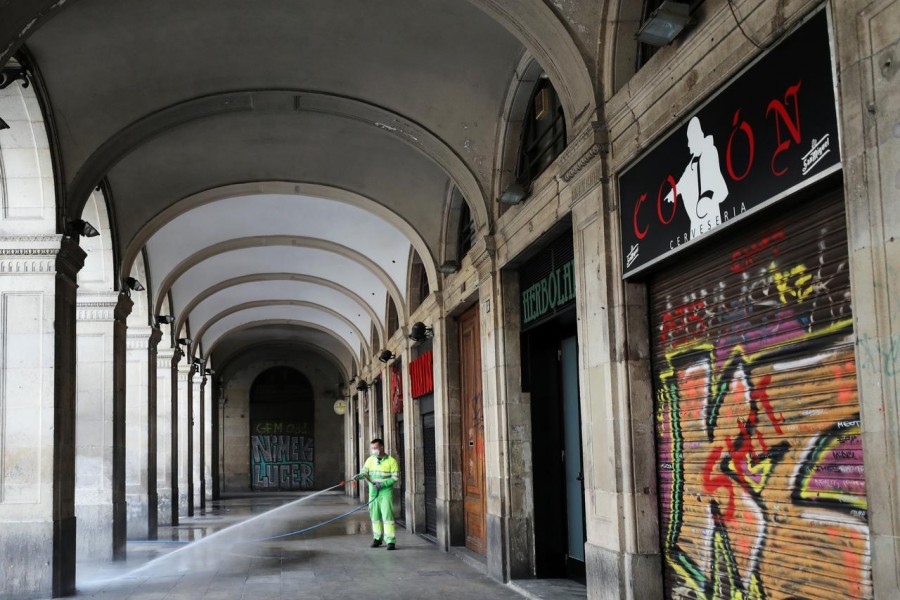Two of the EU's biggest states, Spain and France, have followed Italy in announcing emergency restrictions to combat the spread of the coronavirus.
In Spain, people are banned from leaving home except for buying essential supplies and medicines, or for work.
With 191 deaths, Spain is Europe's worst-hit country after Italy, reports the BBC.
In France, where 91 people have died, cafes, restaurants, cinemas and most shops are now shut.
Italy, which has recorded more than 1,440 deaths, began a nationwide lockdown on Monday.
The World Health Organization (WHO) says Europe is now the "epicentre" of the pandemic.
WHO head Dr Tedros Adhanom Ghebreyesus has urged countries to use aggressive measures, community mobilisation and social distancing to save lives.
In other developments:
- Australia says that from midnight on Sunday (13:00 GMT) anyone entering the country will be required to self-isolate for 14 days. It follows a similar move by New Zealand
- US President Donald Trump has tested negative for coronavirus, the White House said. It comes a week after he hosted an event that included some guests who were later found to have the virus
- The US is to extend its European coronavirus travel ban to include the UK and Republic of Ireland from 04:00 GMT on Tuesday
- The number of deaths in the UK doubled in 24 hours to 21. More than 200 scientists have written to the government urging them to introduce tougher measures
- The UK has advised its citizens against all but essential travel to Spain
- Canada is urging all its citizens abroad to return home while they still can
- Chile has quarantined 1300 people on two cruise ships off the country's coast after an elderly Brit tested positive aboard one of the vessels
- A partial economic shutdown will be in place across Israel from Sunday, with public venues like shopping centres and restaurants closed
- In China, where the coronavirus outbreak started last year, new cases brought in by people arriving in the country outnumbered those by local transmission for the first time
- South Korea on Sunday reported 76 new cases - the first time in nearly a month that the number fell below 100
What measures has Spain taken?
Spain, which has a population of 46.7 million, has recorded more than 6,300 infections.
Late on Saturday, Prime Minister Pedro Sánchez's wife Begoña Gómez tested positive for the virus, the government confirmed.
It said they both remained in the prime minister's residence at La Moncloa in Madrid and were doing fine.
About 1,800 more cases have been recorded since Friday evening - many in the capital.
Under a state of emergency, Mr Sánchez is banning Spanish citizens from leaving home, except for buying essential supplies and medicines, or for work.
All museums, cultural centres and sports venues will be closed. Restaurants and cafes may only do home deliveries.
Essential services like banks and petrol stations will remain open. Schools are already shut across the country.
On Saturday, Mr Sánchez appealed for unity, calling on all regions to put ideological differences aside and put citizens first.
"I want to tell the workers, the self-employed and businesses that the government of Spain is going to do everything in its power to cushion the effects of this crisis," he said.
The state of emergency will last for two weeks - more if deemed necessary and parliament approves.
This will be the second state of emergency in the country since the transition to democracy began in 1975, the first being a 2010 air traffic controllers' strike.
And what about France?
France, a country of 63.5 million people, has reported more than 4,400 confirmed cases.
Prime Minister Édouard Philippe said the number of people in France in intensive care was growing and earlier guidelines for the public were being ignored.
The closure - which went into force at 23:00 GMT on Saturday - applies to restaurants, cafes, cinemas and nightclubs as well as non-essential businesses.
It will not, Mr Philippe said, affect essential businesses which he listed as food shops, chemists, banks, tobacco shops and petrol stations.
Mr Philippe also asked people to reduce their travel, especially between towns. "The best way to slow down the epidemic", he said, was "social distancing".
"I say this gravely - we must all together show greater discipline in the application of these measures," Mr Philippe added.
Local elections due on Sunday will still go ahead, he said. Religious buildings will remain open but gatherings and ceremonies should be postponed.
Schools in France will be closed as of Monday until further notice.
France reported a sharp rise in cases on Saturday, from 3,661 to 4,499. It recorded 12 more deaths, bringing the toll to 79.
The BBC's Paris correspondent, Hugh Schofield, says the measures amount to a dramatic ratcheting-up of the French response, reflecting growing alarm at the fast spread of the virus.


